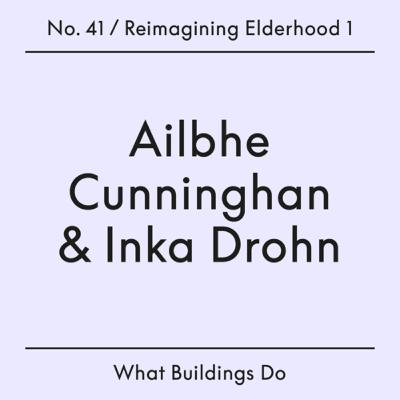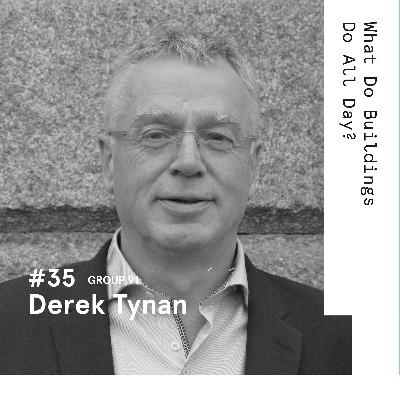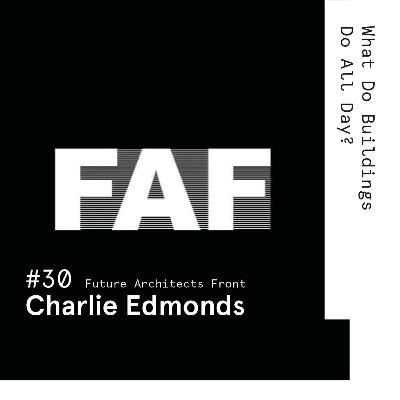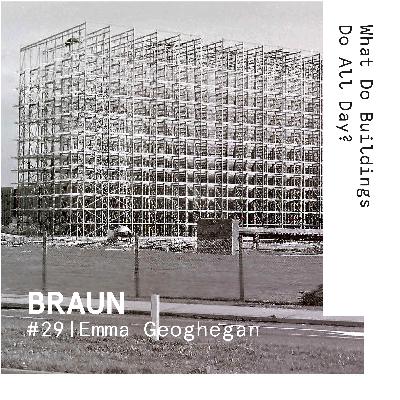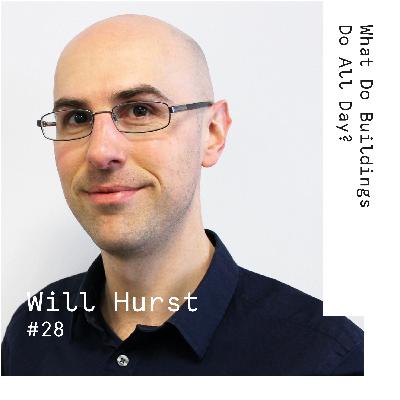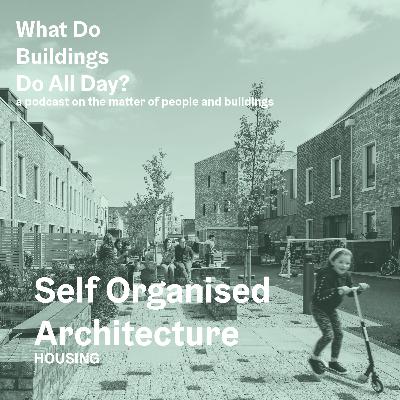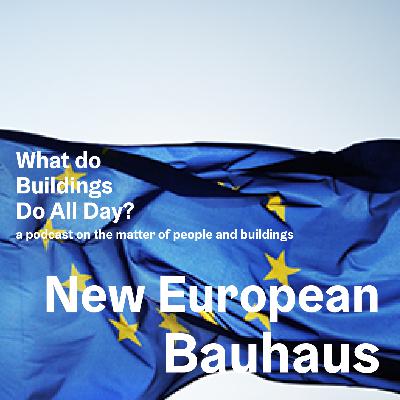Discover What Buildings Do:
An architecture podcast.
What Buildings Do:
An architecture podcast.

What Buildings Do:
An architecture podcast.
Author: Story, Building
Subscribed: 59Played: 744Subscribe
Share
© Story, Building
Description
An architecture and design podcast made in Ireland - Buildings are everywhere and right now we have never been more aware of the built world around us. But what are the stories of our buildings – who designs them, who pays for them, who uses them, what of their architecture – why do some buildings survive and other buildings die and why do some buildings become sites of protest or others get attached to our very identities? In this podcast host Emmett Scanlon speaks to a range of people about architecture and the buildings that matter to them.
47 Episodes
Reverse
This is the first of three episodes made in response to a project called Reimagining `Elderhood. Initiated by a group called SOA, or Self-Organised Architecture - a group already in conversation on episode 26 of the podcast - Reimaging Elderhood is an architecture-led project that explores the future housing needs of people in mid-life in Ireland. First up in this episode, Emmett Scanlon talks to Ailbhe Cunningham and Inka Drohn. Ailbhe is an architect based in Cork who, in this project, worked out of a record shop with a community of mjusicians, collectors and more who had formed around the shop. Ailbhe was mentored by Inka Drohn, an architect based in Berlin Germany who specialises in cop-operative and self-organised housing projects. Find out more about this project at www.soa.ie
.
The podcast we recorded on zoom in October 2023.
.
Graphic design by Eamonn Hall
.
Music by Sinéad Finnegan
.
What Buildings Do is supported by the Irish Architecture Foundation as part of their commitment to advancing the culture of architecture in Ireland.
In this podcast, Emmett Scanlon talks to Luke McManus, a documentary film maker based in Dublin.
Luke's debut feature documentary as a director, North Circular, had its International Premiere at Sheffield Doc/Fest in 2022 and won awards at Dublin IFF, Louth IFF and IndieCork Film Festival. It recently won a prestigious Grand Prix at France’s biggest documentary festival, FIPADOC in Biarritz in southwest France. North Circular is currently screening in cinemas across Ireland and in London and has had many sold-out screenings and excellent reviews - the Guardian's Peter Bradshaw awarded it four stars and said it was "resonant, vivid and beautifully shot, pregnant with images and ideas, a film made with real artistry."
_
_
The music is by Sinead Finnegan and is played by The Delmaine String Quartet. The podcast was recorded on zoom in January 2023.
In this episode we talk to Valerie Mulvin. The podcast is part of the Temple Bar 30 Series, an ongoing recording project with members of Group 91. Back in the 1980s a group of young and eager architects began working together in a loose collective, anxious to make things happen in Dublin city. By 1991, this group formalised as Group 91 and contained among others, Shelley McNamra, Yvonne Farrell (Grafton Architects), John Tuomey and Sheila O Donnell, Mc Cullough Mulvin architects and McGarry NiEanaigh. Valerie was part of G91 with Niall McCullough, who died in 2022. As practitioners and writers in and of architecture, Niall and Valerie have published since very early in their career. The podcast begins then, with Valerie reflecting on how and why the desire to research, write and publish came from and how she and Niall sustained this across their entire career. Valerie has just published Approximate Formality: Morphology of Irish Towns to public and critical acclaim and she is now working to complete a book underway by Niall before his death. With a mood and tone of reflection and optimism, Valerie looks back at how she and Niall became involved in G91, and their early research and study trips, their meetings with Aldo Rossi and their first book A Lost Tradition, all of which fundamentally formed their lives in architecture. She reflects too on the impact and legacy of the Temple Bar project, on Dublin, culture, policy and their own individual practice.
_
The music is by Sinead Finnegan and is played by The Delmaine String Quartet. The podcast was recorded live at Valerie's home in August 2022.
In this episode Emmett Scanlon talks to Adam Nathaniel Furman. Adam is a British artist and designer of Argentine and Japanese heritage based in London. Trained in architecture, Adam's atelier works in spatial design and art of all scales from video and prints to large public artworks, architecturally integrated ornament, as well as products, furniture, interiors, publishing and academia.
_
As an activist, vocal defender of workers rights, particularly those of interns, and as an articulate speaker on and about architecture and design, there were many reasons to talk to Adam but it was the arrival of the book Queer Spaces edited by Adam and Joshua Mardel, and designed by Alex Synge, that finally prompted the talk.
_
A book that is long overdue, it provides an accessible atlas or canon in Adam’s words - of queer spaces, in part for queer students of architecture and design needing a frame of reference and references to support their work. But discussing the book also lead to conversations about Adam’s own work, his experience as a queer designer, the challenges he has faced in practice, what he witnessed and reacted to in his architectural education, and what now might his new, true passion.
_
When in Dublin, Adam gave a dense, intelligent, lucid and often funny lecture at the invitation of the Architectural Association of Ireland and the conversation begins discussing his first visit to Dublin and if humour was always part of his lecture repetoire. A trigger warning though, Adam does discuss forms of bullying in education and at times is deeply honest about his own experiences.
_
ABOUT ADAM
Adam is a British artist and designer of Argentine & Japanese heritage based in London. Trained in architecture, Adam's atelier works in spatial design and art of all scales from video and prints to large public artworks, architecturally integrated ornament, as well as products, furniture, interiors, publishing and academia.
Adam's work has been exhibited in London, Paris, New York, Milan, Melbourne, Rome, Tel Aviv, Mumbai, Vienna & Basel, amongst other places, is held in the collections of the Design Museum, the Sir John Soane’s Museum, the Carnegie Museum of Art, the National Gallery of Victoria, the Abet Museum, and the Architectural Association, and has been published widely.
The atelier has completed, and ongoing projects both internationally (Europe, the US, S America, the Middle East, East Asia) and in the UK. Adam has lectured at the RIBA, Harvard GSD, UC Berkeley, the Carnegie Museum of Art, the Vitra Design Museum & the Casa dell’Architettura Rome, amongst others, has taught courses at several universities as well as having been Studio Master of Productive Exuberance at Central St Martins in London, is co-director of Saturated Space at the AA (an influential research group on colour in Urbanism and Architecture), is a published author, a vocal advocate for diversity and representation in architecture, urbanism and design, and has been a judge for the Dezeen and FRAME awards, amongst others.
ABOUT THE PODCAST
What. Buildings Do is part of Story, Building, the independent platform for the critical discussion of architecture, based in Ireland. Foreign Exchange: Conversations on Architecture Here and Now is the first publication, available here.
This is a bonus episode of the podcast. It is a review of and a reflection on i see Earth, building and ground 1991-2021 an exhibition by Tom de Paor. The recording of this text was first broadcast at an event in VISUAL Carlow, on May 1st 2022, at an event called MAYDAY, a 108 minute orbit around the earth, curated by Nathalie Weadick and Hugh Campbell. The text read here will also be published on storybuilding.ie. “Still open, i see Earth presents an ambitious large-scale installation of sculptural work by one of Ireland's foremost architects, Tom dePaor. The exhibition spans his practice from 1991-2021 through the media of sculpture, objects, film and drawing, painting and writing. Curated and commissioned by Nathalie Weadick and including new documentary work by Peter Maybury, i see Earth is produced by VISUAL Carlow and the Irish Architecture Foundation.
In this episode, Emmett Scanlon talks to Ellen Rowley, architectural and cultural historian. The podcast covers Ellen's discovery of buildings and architecture through the close noticing of the world around her, the role and value of history in architecture, when history starts and, what buildings do.
ABOUT ELLEN ROWLEY
Ellen Rowley is Assistant Professor in Modern Irish Architecture at the School of Architecture, Planning + Environmental Policy, UCD. She is an architectural and cultural historian, a teacher and a writer. Interested in architectural obsolescence, the intersection of social histories and buildings, and the place of the Catholic Church in Ireland’s built environment, she has published extensively including Housing, Architecture and the Edge Condition (2019, Routledge, Taylor + Francis); and (co-editor), Making Belfield. Space + Place at UCD (2020, UCD Press); as well as More Than Concrete Blocks, volumes 1 and 2 (2016/9, Four Courts Press) which are socio-cultural histories of Dublin’s buildings from 1900 to 1972. Volume 3 is currently under production.
Before that she was co-editor of the landmark Yale series, Art and Architecture of Ireland (Volume 4, Architecture 1600 – 2000, YUP/RIA, 2014), Generally, this history is pioneering and so, she admits, there are mistakes. In 2017, Ellen was awarded Honorary Membership of the Royal Institute of Architects of Ireland, for services to Irish architecture. Being privileged with an education from Trinity College Dublin and Cambridge University, UK, Ellen is an advocate for access to university education and specifically, the need for widening participation in architectural education.
CREDITS:
What Buildings Do is part of Story, Building the platform for the critical discussion of architecture in Ireland. Music is by Sinead Finnegan, design is by Eamonn Hall. The What Buildings Do logo is based on an enamel tile made by Livia Hurley. The podcast was recorded LIVE in March 2022.
In this short episode Emmett Scanlon describes the origins and purpose of the new platform Story, Building. The podcast, What Buildings Do, is now part of that platform. Story, Building is a new platform for the critical discussion of architecture in Ireland. The podcast also shares information on how to submit work for publication in print or online. Full details are on the website. Music is by Rachael Lavelle.
This is a the second in a series of conversations about Temple Bar with the architects of Group 91, initiated on the 30th anniversary of that project. Part reflection and projection, in this episode architect Derek Tynan talks about arriving back to Dublin the 1980s, then, he calls, a city of decay He recalls how then a new culture of confidence of architecture took hold in Ireland; Group 91 got going and got the gig; he reflects on how G91 could not exist now; the perennial issue of procurement; and how housing is being designed today.
_
The music is by Sinead Finnegan and is played by The Delmaine String Quartet. The podcast was recorded on zoom in November 2021.
In this episode we discuss two new books on architecture, buildings and Ireland's capital city, Dublin. The books are The Dublin Architecture Guide 1937-2021, by Paul Kelly, Cormac Murray and Brendan Spierin, published by the Lilliput Press and designed by Eamonn Hall. The second book is The Dignity of Everyday Life: Celebrating Michael Scott’s Busaras, with text by Eoin O' Broin and photographs by Mal McCann. The book is designed by Stuart Coughlan and published by Merrion Press. The podcast covers the themes and content of the books individually and together, paying particular attention to the design of the books and how photographs are used. Joining Emmett Scanlon to discuss these books are architect David Capener and photographer Noel Bowler.
ABOUT THE CRITICS
David Capener is an architect, educator and writer and a lecturer at the Belfast School of Architecture. He himself has just published a book as part of ANNEX, a six person team who made ENTANGLEMT, the national pavilion at the 2021 Biennale of architecture in Venice. The book, STATES OF ENTAGLEMENT: Data in the Irish Landscape, is published by ACTAR and designed by Alex Synge.
Noel Bowler, who studied at the Belfast School of Art and is currently Senior Lecturer in Photography at the University of Suffolk.
Noel Bowler is a photographer and educator. His photographs, exhibitions and publications continue to look at the ongoing consideration of the political forces that shape our world, reflected through the organisation of social space. Made over a six year period, Noel’s most recent book ABOVE THE FOLD is a series of photographs taken in some of the most respected and recognised newspaper newsrooms from around the world. The book was designed by Robert Farrelly at POST STUDIO and published by RARE editions.
NOTE:
The podcast was recorded on zoom. During the course of the recording there was some local distortion on some aspects of the sound. We apologise for this and have done our best to correct this. Music in this podcast is by Rachael Lavelle.
In this episode host Emmett Scanlon speaks to Zoë Berman of Studio Berman. Zoë is an architect and a university lecturer. She has lectured on design and equity, and written for the RIBA Journal, Blueprint magazine and Architecture Today. Zoë is also one of the founding members of the Part W Collective, which describes itself as “a collective of engaged and proactive women working in design education, architecture, planning, engineering, policy, infrastructure and sustainability."
Founded in 2018, the collective says it is intergenerational - "formed by women from diverse backgrounds who are working together to call time on gender inequality, in all its forms, in our built environment."
In the podcast Zoë talks about the work of Part W, in particular the alternative list campaign, their first campaign and one which simply asked, if we did not have the list of men who had previously won the Royal Institute of British Architects Royal Gold Medal, who would be on that list? Who were the architects who were women who had been overlooked, forgotten or ignored? From there we discuss more broadly the challenges faced by women working in the built environment and architecture.
Members work in the areas of architecture, project management, place making, sustainable transport, design eduction and journalism - and include Christine Murray, Dr. Harriet Harriss, Hilary Satchwell, Kelly Clark, Sarah Castle, Sarah Wigglesworth, Yemi Aladerun, Sarah Ackland, Nadine Adamski and Fiona MacDonald and we work in friendship with multiple volunteers and supporters.
ABOUT:Zoë Berman is an architect, university lecturer and founder of Part W – an action group founded in 2018 that campaigns for gender equality across the built environment sector. Zoë is director of Studio Berman, has lectured extensively on design and equity, and written for the RIBA Journal, Bluep;rint magazine and Architecture Today. She is a Design Council Expert and member of the Oxford Design Review Panel. Zoë is writing a book profiling women who are shaping the design of cities.
Portrait photo: Morley von Sternberg
In the podcast Emmett Scanlon talks to James Albert Martin and Eibhlín Ní Chathasaigh, who together with Anne Dorthe Vester and Maria Bruun are Soil Lab. In September 2021, Soil Lab unveiled their installation on a vacant lot in Chicago as part of the Chicago Architecture Biennial.
In the podcast the pair discuss the project from the initial idea which, after an open call from the Danish Arts Foundation, was to make a housing for a ceramic kiln on the site, and all the way through to the opening. They share the obvious logistic challenges of making a project like this from Denmark and Ireland and in America, especially during a pandemic. However, challenging as it was, it is clear the team remain enthused, emboldened and engaged with and by the work and all that unfolded day by day across the project, and in particular how the project was enriched by the participation of residents and others who live and work adjacent to the site. James begins by telling us about the Chicago Architecture Biennial and from their pair talk directly and honestly about what happened, what they learned, and a little about what might be next.
More about the project here: https://www.instagram.com/soillabnorthlawndale
ABOUT SOIL LAB
The Soil Lab project team is made up of three architects, James Albert Martin, Eibhlín Ní Chathasaigh, and Anne Dorthe Vester, and one designer, Maria Bruun, working across different scales, materials, and disciplines. James, Eibhlín, and Anne Dorthe studied together at the Aarhus School of Architecture in Denmark and have since collaborated on several projects. James and Eibhlín are based in Dublin, where they have both worked for internationally renowned architecture firms. Maria and Anne Dorthe are based in Copenhagen, where they founded the studio MBADV in 2013. Their practice with MBADV is at the intersection of architecture, design, and fine art. The project team comes together around a belief in making as a collaborative act: making moments, and making spaces and places for people to gather, to celebrate, and to treasure space.
Eibhlín Ní Chathasaigh graduated from the Aarhus School of Architecture, Denmark, in 2011. Since graduating she has worked for Atelier Peter Zumthor in Switzerland and Grafton Architects in Dublin, Ireland. In 2018, Eibhlín joined James and Anne Dorte in participating in the REFORM Design Biennale with their collaboration Woven Construct, constructed in the garden of Munkeruphus Center of Contemporary Art, in Zealand, Denmark. Eibhlín believes imagination is the central strength of architecture and is interested in the social act of architecture and design as a collaborative conversation. It is with great pleasure that, together with the people of North Lawndale and the Soil Lab team, she embarks on transforming a vacant lot in West Chicago into a new public space.
James Albert Martin is a registered architect with the Royal Institute of the Architects of Ireland and Grade 3 Accredited in Architectural Conservation. He has taught at The Aarhus School of Architecture and at University College Dublin where he is currently a Design Fellow. James is interested in the act of making, and his work is informed by this collaborative act. James holds a MA from The Aarhus School of Architecture and has also undertaken courses in joinery at Capellagården - a school for craft and design. Since graduating he has worked with international studios; Sou Fujimoto Architects, Herzog & de Meuron, and Grafton Architects. In 2018, James, Eibhlín, and Anne Dorte participated in REFORM Design Biennale with their collaboration Woven Construct, a seat, a screen, space, which they constructed in the garden of Munkeruphus, north of Copenhagen.
In 2021 Ryan Kennihan was Highly Commended for a house in north Dublin, in the 'New Into Old' awards, by the Architectural Review. This house is another in a series of lauded house projects undertaken by Ryan and his team in RKA over the last 15 years of practice. In the podcast we begin with that house, exploring how to work with fragments of existing buildings, returning them to a family for use today and into the future. Ryan talks about building trust with clients, working with building contractors, his interest in the existing or as found, the ideas of continuity in architecture, and the ethical position of the architect. The podcast also covers Ryan's views on the culture of architecture in Ireland, and what Ireland offers that many places do not. About to launch their first book on work to date, Ryan concludes by sharing with us a building that continues to surprise him and inform his work in architecture.
About Ryan Kennihan:
Ryan studied architecture at Cornell University. Originally from Chicago, he has been based in Dublin, Ireland since 2002, establishing his practice in 2007. He has taught architecture at University of Navarra in Pamplona, the Porto Academy, University College Dublin and the Dublin School of Architecture at TU Dublin where he is currently a lecturer. Ryan is a registered architect with the Royal Institute of the Architects of Ireland and Grade 3 Accredited in Architectural Conservation.
The podcast was recorded on ZOOM in August 2021 \ Music is by Sinead Finegan \ played by the Delmaine String Quartet.
Architect portrait by Al Higgins.
The last years have seen a growing consideration of the terms and conditions of employment for architects. In this episode Emmett Scanlon speaks to Charlie Edmonds who cofounded in 2021 the Future Architects Front, a group founded to end "the exploitative practices" of workers in architecture. Charlie outlines the reasons he and Priti Mohandas founded the group, their engagement with the Royal Institute of British Architects (RIBA), he calls for more diversity in education available to architects and how discussions of preparing students for the "real world" in architecture education are often about holding the status quo and resisting change. |
About FAF: Future Architects Front is a grassroots organisation of architectural workers and students. FAF campaigns to end the exploitative practices that have come to define the world of architecture. It was created and is run by Charlie Edmonds and Priti Mohandas, British designers and researchers. The pair met and began the work of FAF while conducting their Master’s in Architecture and Urban Design at the University of Cambridge. |
Music is by Sinead Finegan, played by the Delmaine String Quartet (Philip Dodd, leader). The podcast was recorded on Zoom in July 2021.
In this episode, Emmett Scanlon talks to Emma Geoghegan about the currently vacant BRAUN factory building in Carlow, Ireland. Carlow is a town with a combined urban and rural population of about 25,000 people. Back in 1974 BRAUN, the German company, set up a new factory in Carlow, which, at its peak employed 1,400 people most of whom were women. Details of the Braun Archive can be found on the VISUAL website. Details of the Women in the Machine project can be found here.
_
Photo of BRAUN under construction: Dermot O Brien, used with permission.
ABOUT EMMA GEOGHEGAN
Emma Geoghegan is an architect, urban designer and lecturer at the Dublin School of Architecture TU Dublin. Since 2007 her practice has focused on the design of beautiful, resilient, buildings and places for people with a broad range of abilities and needs. In parallel her research and teaching practice has been driven by a commitment to the social purpose of architecture and inclusive design principles and embedding these in architectural education.
After graduating from the University of Edinburgh in 2002, Emma completed her professional practice studies at the AA and worked for a large healthcare architecture practice in London. In 2010 she completed an MSc in Urban Design at UCD and from 2007-2017 was a partner in MEME Architecture an award-winning design practice working on projects across the UK and Ireland. Since 2017 Emma has continued to work in collaborative private practice and undertakes consultancy work in the areas of inclusive design and accessibility alongside her role as Chair of the Bachelor of Architecture programme at TU Dublin. She is also currently a Vice President of the RIAI and a board member of Arts and Disability Ireland.
DEDICATION
This podcast is dedicated to Angela Jupe. I met Angela several times over the years and to my shame I did not know she was the architect of this building and I never asked her about it. I regret this, she was a formidable and energetic woman, who made an impact on so many people who met her. She died in her home in Offaly on May 4th 2021 | Emmett Scanlon
__
Music is by Sinead Finegan, played by the Delmaine String Quartet (Philip Dodd, leader).
The podcast was recorded on Zoom in July 2021.
In this episode, Emmett Scanlon talks to Will Hurst, the Managing Editor of The Architects’ Journal, based in London. Will has been leading the RetroFirst campaign at the Architect's Journal since late 2019. The podcast covers the origins and ambitions of this campaign, at the heart of which is the idea that "the greenest building is the one that already exists". The conversation touches on the challenges faced by all in construction at a time of climate crisis, the reaction of the architecture profession to RetroFirst, the circular economy and why it makes little climate sense to demolish buildings like the Derby Assembly Rooms in Derby.
_
ABOUT WILL HURST
Will Hurst is an award-winning journalist who has spent his career writing about architecture and construction in the building press and for national titles such as the Guardian, Times and Financial Times. Will has written extensively about the built environment’s contribution to the climate crisis and is currently leading the AJ’s RetroFirst campaign for the re-use of existing buildings. His investigation into the Garden Bridge won him a Press Gazette British Journalism Award in 2017 and was shortlisted for that year’s Paul Foot Award.
__
Music is by Sinead Finegan, played by the Delmaine String Quartet (Philip Dodd, leader).
The podcast was recorded on Zoom in July 2021.
_
The 17th Venice Architecture Biennale open-end at the end of May, a year later than intended, due to Covid restrictions and cancellations. This year the Irish pavilion, at what is one of the largest exhibitions of architecture in the world, was commissioned and curated by an interdisciplinary group of architects, artists and researchers, together known as ANNEX. The pavilion is called, Entanglement, and it explores the materiality of data, and the interwoven human, environmental and cultural impacts of communication technologies. As you will hear this is a particularly Irish concern right now, with Ireland currently being the data capital of Europe, which, at its simplest terms, is manifest in the sheer number of large data centres being built on the Island. But is far more complex and far more profound than that, and in the podcast you will here this very contemporary concern with data and the cloud, has resonances with our histories of social and public space and implications for the planet’s resources, because the cloud is greedy.
Host Emmett Scanlon speaks to David Capener and Donal Lally, two ambassadors for the six member Annex team. The podcast covers working as part of an interdisciplinary team, the genesis of the pavilion, Ireland as a data capital, the value of exhibitions and the value of the Venice Biennale.
Entanglement is due to tour Ireland in 2022.
About Annex:
Annex is an international multidisciplinary research and design collective, comprised of a core team of
architects, artists, and urbanists, whose work operates between and beyond the subject areas of computer
science, gaming platforms, technology and public space, data centres, sensor technology, and large technical
systems. Members include Sven Anderson, Alan Butler, David Capener, Donal Lally, Clare Lyster and Fiona
McDermott.
Ireland at Venice is an initiative of Culture Ireland in partnership with the Arts Council and in 2021 the
pavilion also has the support of: The Department of Tourism, Culture, Arts, Gaeltacht, Sport and Media;
Royal Institute of Architects Ireland; TU Dublin School of Creative Arts; TU Dublin Graduate School of
Creative Arts and Media; Trinity College Dublin; CONNECT Research Centre for Future Networks and
Communications; University of Illinois at Chicago, Creative Activity Award; Valentia Slate, ARUP, Office of
Public Works and Green on Red Gallery.
David Capener is an architect, critic, writer, academic and educator. He is a researcher at
Technological University Dublin. He has taught on the master’s program at Queens University School of
Architecture and has written for The Irish Times, The Guardian, The Sunday Times and numerous other
print and online publications.
Donal Lally is an architect and principal at zero-degree machine [z-dm], an architecture studio
that operates in areas within and beyond the traditional boundaries of architecture, landscape and urbanism.
Donal is a Lecturer in Design Theory at TU Dublin. Donal’s PhD project, The Posthuman City, explores how
data infrastructures reconfigure human and non-human habitats.
In this episode Emmett Scanlon talks to Padraig Flynn and Tom O Donnell of SOA (Self Organised Housing). In the podcast the pair outline the origins of the group and the social, spatial and architectural potential of community-led housing. The pair present a realistic but optimistic way of understanding and providing housing in Ireland.
-
About SOA
SOA SOA is a not-for-profit action research think tank, formed in 2017 to research and promote cooperative and collaborative approaches to housing in Ireland. We study proven and successful UK, European and North American strategies and look at how these might be adapted to Ireland. In 2019 SOA hosted a series of events on the subject of Community-Led Housing, including an international conference which was attended by over 400 people. Building on the research base generated by this and other activities, throughout 2020 SOA have coordinated a comprehensive multi-stakeholder study to ‘Roadmap a Viable Community-Led Housing Sector for Ireland’. SOA are also currently the Irish partner in the EU Interreg Sustainable Housing for Inclusive and Cohesive Cities (SHICC) project, which seeks to support the establishment of more successful Community Land Trusts (CLTs) in cities across the North-West European region.
-
About Tom
-
Tom O’Donnell studied architecture at UCD and in 2000 completed an MPhil at Cambridge University under Peter Carl and Dalibor Vesely. He worked at Cork City Architect’s department on a number of public projects until 2007 and since then, has been in practice in Germany and Ireland. In 2017, he co-founded SOA Research CLG, an action research think tank to promote cooperative and collaborative approaches to housing and community development, where he is currently a co-director.
-
On Padraig
-
Padraig Flynn studied architecture in UCD, and currently works in practice with LiD Architecture, an Irish/Berlin architecture and research practice specialising in innovative housing and participative design techniques. Previous work at Cullen Payne Architects (Dublin) and Heren 5 Architecten (Amsterdam) included housing projects at a range of scales in Ireland, London and Amsterdam. Padraig is a founding director of SOA Research, and co-author with Tom of the recently published Roadmapping a Viable Community-Led Housing Sector for Ireland series, which outlines the development of a community-led housing infrastructure for Ireland. Music is by Sinead Finegan and is played by the Delmaine String Quartet. The podcast was recorded on zoom in May 2021.
In 2020 EU President Ursula von der Leyen launched the New European Bauhaus, an initiative intending to address climate by and through design. In this episode architect Orla Murphy outlines the values and workings of this initiative and talks about its potential impacts on architecture, on Ireland and on our shared futures on the planet. The conversation also engages with matters of civic and public space and the use of it by people in towns and cities.
About Orla Murphy.
Orla Murphy B. Arch M. RIAI is a part-time Assistant Professor in the School of Architecture Planning and Environmental Policy (APEP), Co-Director of the UCD Centre for Irish Towns (CfIT), and owner of Custom Architecture. Orla has been External Examiner in CCAE and invited speaker at UL, CCAE, WIT and TUD. In 2018 Orla was Co-Commissioner and Co-Curator of FREE MARKET, Ireland's national representation at the architecture biennale, Venice. In 2020 Orla was appointed to the round-table group for the New European Bauhaus.
Music is by Sinead Finegan and is played by the Delmaine String Quartet. The podcast was recorded on zoom in May 2021.
Northern Ireland is 100 years old on May 3rd 2021. In this podcast Emmett Scanlon speaks to four people working in and through architecture in Norther Ireland. Aidan McGrath is a director of McGonigal McGrath architects. Jane Larmour leads ArighoLarmourWheeler architect based in Dublin and Belfast. Aisling Rusk is founder of Studio Idir and Ciaran Fox is the Director of the RSUA (Royal Society of Ulster Architects). What follows is a broad conversation in which individually and collectively the quartet outline their own understands of the current terms and conditions in which architecture is being commissioned, designed, built and finally shared with a public. Naturally the specific political context of Northern Ireland comes up - you will have heard Aidan refer to this in the introduction - and we hear how this might be driving and informing types of architectural practice.
__
Music is by Sinead Finegan, played by the Delmaine String Quartet (Philip Dodd, leader).
The podcast was recorded on Zoom in April 2021.
In this bonus episode of the podcast, Emmett Scanlon laments the continued closure of rooms for art. He recalls from memory, time spent in the Crawford Gallery in Cork. In the end, these recollections provide some clues as to what it is that buildings do all day.
__
Music is by Sinead Finegan, played by the Delmaine String Quartet (Philip Dodd, leader).
The podcast was recorded on Zoom in April 2021.


